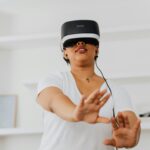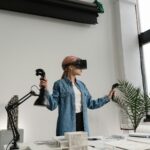In a world driven by rapid technological innovation, “reality” is no longer just what we see or feel. It now includes immersive virtual environments, interactive augmented layers, and artificial intelligence-generated worlds that blend seamlessly with our physical lives.
This transformation is not merely philosophical; it is an economic revolution reshaping industries such as healthcare, gaming, real estate, retail, and education while creating high CPC opportunities for investors, entrepreneurs, and content creators.
In this detailed guide, we will cover:
- How the definition of reality has evolved
- The impact of AI on daily reality
- The rise of virtual reality (VR) and its economic power
- How augmented reality (AR) changes real-world interaction
- Real estate in the digital era
- High CPC monetization opportunities
- The challenges and ethical concerns of the reality revolution
What is Reality in the 21st Century?
Traditionally, reality refers to the physical world we can see, hear, and touch. Today, reality is a spectrum:
- Virtual Reality (VR): Fully immersive digital environments experienced through headsets.
- Augmented Reality (AR): Digital overlays on the physical world viewed via smartphones or AR glasses.
- Mixed Reality (MR): Interaction between physical and digital objects in real-time.
- Artificial Intelligence (AI): Generative models creating hyper-realistic images, simulations, and virtual beings.
This redefinition is creating a new economy around reality itself.
Artificial Intelligence: Shaping the Foundation of Modern Reality
AI is no longer just a back-end tool for automation; it is shaping human experiences across industries:
- Healthcare: AI diagnoses diseases faster than humans, powers robotic surgeries, and manages personalized treatment plans.
- Content Creation: AI generates realistic images, videos, and voiceovers, revolutionizing marketing and entertainment.
- Customer Experience: AI chatbots and virtual assistants provide 24/7 support, reshaping retail and services.
- Smart Cities: AI-powered traffic management and energy optimization are improving urban living.
Virtual Reality: Immersive Economies in Action
1. VR in Gaming
Gaming is the flagship of VR adoption, with platforms like Meta Quest 3, PlayStation VR2, and HTC Vive delivering immersive experiences. Titles such as Beat Saber, Half-Life: Alyx, and Resident Evil VR showcase VR’s capabilities.
2. VR in Healthcare
VR aids in:
- Surgical simulations
- Phobia treatments
- Pain management through distraction therapy
- Physical rehabilitation with gamified exercises
3. VR in Education
Students can:
- Explore historical sites virtually
- Perform lab simulations safely
- Attend lectures in VR classrooms, enabling global learning
4. VR in Business
Companies use VR for:
- Remote collaboration and meetings
- Virtual prototyping and design visualization
- VR-based employee training
High CPC Keywords:
- VR headset deals
- VR healthcare apps
- VR training software
- VR educational tools
- VR for business collaboration
Augmented Reality: Enhancing the Physical World
AR is transforming the way we interact with the world:
- Retail: Virtual try-ons for clothes, makeup, and furniture (e.g., IKEA Place).
- Navigation: AR overlays on Google Maps and Apple Maps guide users precisely.
- Marketing: AR advertisements create interactive brand experiences.
- Healthcare: Surgeons use AR to view 3D models during operations.
AR in Industrial Applications
AR assists in:
- Equipment maintenance with overlay instructions
- Warehouse management with real-time inventory tracking
- Employee training with AR-enhanced procedures
High CPC Keywords:
- AR app development services
- AR shopping platforms
- AR marketing solutions
- AR navigation apps
- AR healthcare technology
Real Estate: The New Reality Frontier
Real estate remains one of the most stable investments, and technology is transforming this industry too.
1. Virtual Property Tours
3D tours and VR enable buyers to explore properties remotely, reducing the need for physical visits and speeding up sales cycles.
2. AI in Real Estate
AI predicts market trends, assesses property values, and identifies profitable locations, making real estate investment smarter.
3. Virtual Real Estate
Platforms like Decentraland, The Sandbox, and Otherside offer digital plots of land in virtual worlds. Brands and individuals purchase these lands for:
- Virtual stores
- Advertising spaces
- Hosting virtual events
4. Smart Homes and IoT Integration
Smart devices, AI-powered energy management, and AR-based home controls increase property value and appeal to modern buyers.
High CPC Monetization Opportunities in Reality Tech
If you are a blogger, YouTuber, or digital entrepreneur, you can generate high AdSense revenue by focusing on:
- Product reviews for AR/VR devices
- “How to invest in virtual real estate” guides
- Tutorials for AI tools in real estate and healthcare
- Industry news and analysis for AR/VR/AI markets
- Affiliate links for VR headsets and AR app development tools
These topics attract high-value advertisers from tech, healthcare, education, and real estate sectors.
Challenges and Ethical Considerations in the Reality Revolution
Despite the immense potential, the reality revolution poses challenges:
- Data Privacy: AR and VR devices collect sensitive user data that must be protected.
- Accessibility: High-quality AR/VR devices remain expensive.
- Health Concerns: Prolonged VR/AR use can cause eye strain, disorientation, and mental fatigue.
- Content Regulation: AI-generated deepfakes and virtual environments raise ethical concerns regarding misinformation and identity misuse.
- Environmental Impact: The hardware required for AR/VR consumes resources, impacting sustainability goals.
The Future: Reality as a Service (RaaS)
With the rise of cloud computing and 5G, Reality as a Service (RaaS) will become mainstream:
- Businesses will subscribe to AR/VR platforms for training, collaboration, and marketing.
- Consumers will access VR entertainment and virtual tourism as services.
- AI-powered reality simulations will assist in urban planning, disaster response, and personalized education.
This will open new investment and business opportunities for:
- AR/VR app developers
- Hardware manufacturers
- AI service providers
- Real estate investors in virtual lands
Final Thoughts: Prepare for the Reality Renaissance
Reality is evolving beyond our physical senses, merging AI, VR, AR, and real-world experiences to create a new, richer layer of existence.
For investors, this means exploring:
- AR/VR startups
- AI-driven PropTech
- Virtual real estate opportunities
For developers and entrepreneurs, it is time to build:
- AR shopping and educational apps
- VR experiences for entertainment and training
- AI tools that enhance productivity and personalization
For content creators and bloggers, focusing on these emerging reality trends will drive high-value traffic and premium AdSense earnings.
The reality revolution is not in the future—it is happening now. Those who adapt, learn, and build within this new paradigm will lead in the next decade.


